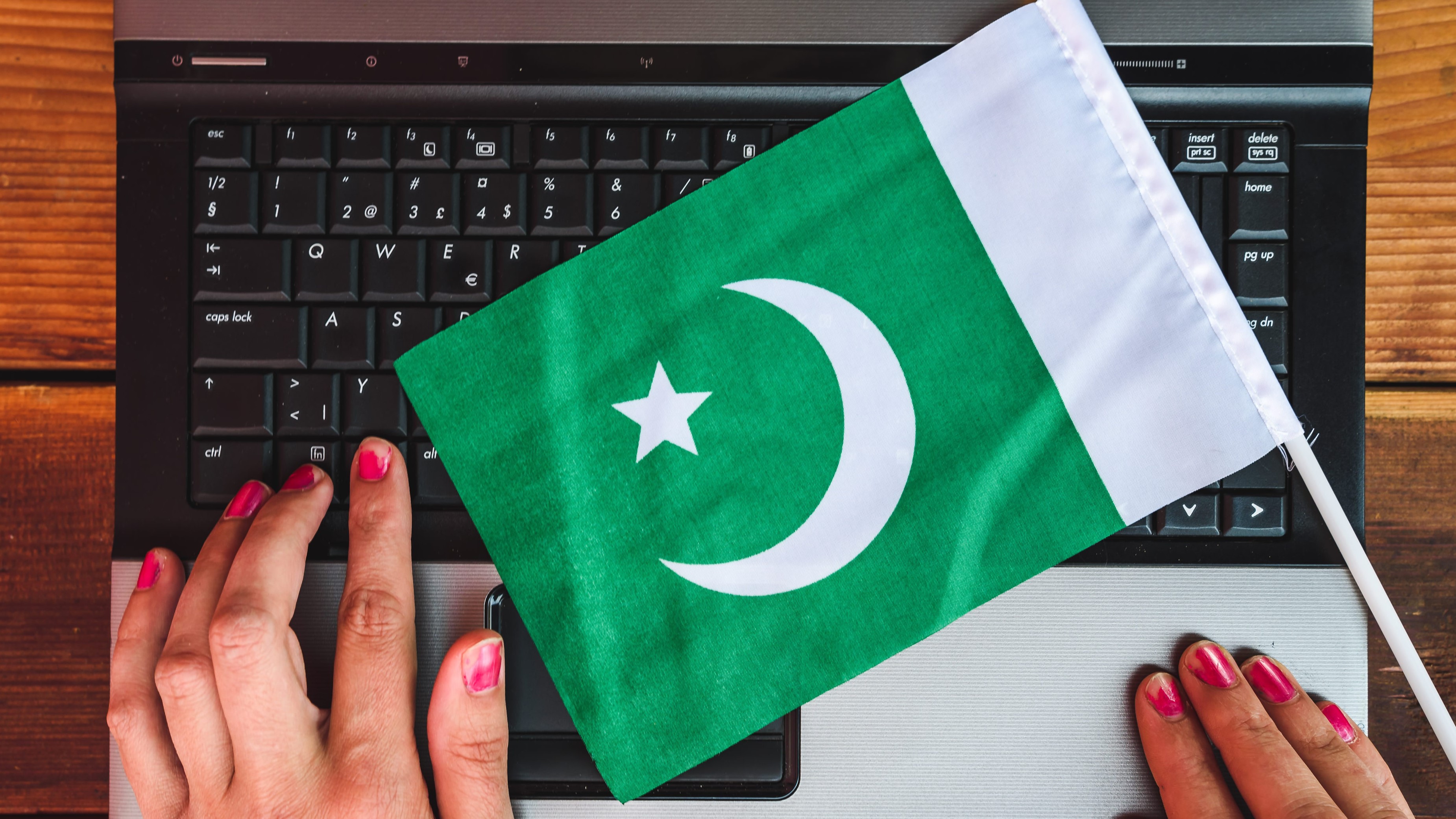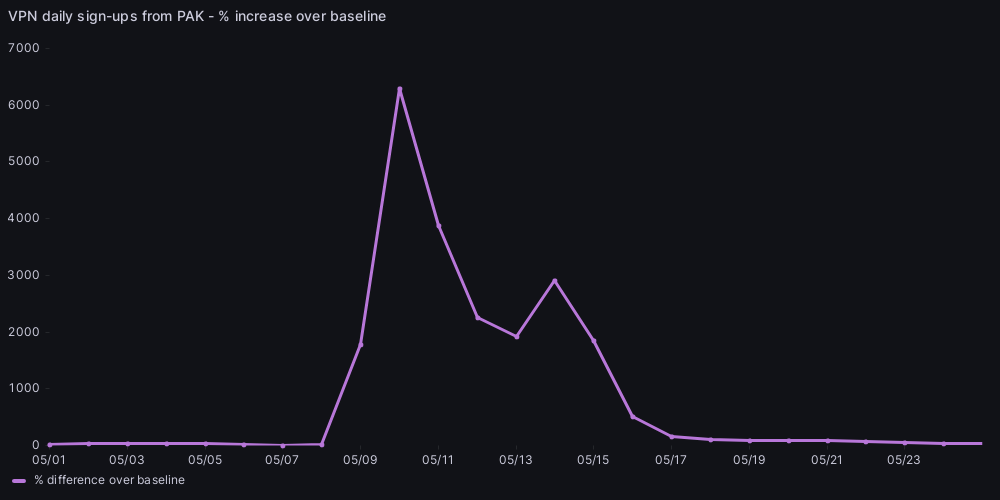
Imagine waking up one day, trying to access your social media account—you might want to read the news or chat with friends, who knows—and getting an "Oops, something went wrong" alert mocking you from the center of the screen. Well, that's what people in Pakistan have been experiencing every day since last February.
Pakistan authorities began blocking social platform X (formerly known as Twitter) on February 17, 2024, about a week after completely restricting the internet before and during election day as an alleged "security measure." However, while these large-scale disruptions lasted just a few days, the X ban is still ongoing at the time of writing, forcing citizens to turn to the best VPN services to access the app.
It isn't the first time Pakistan has pulled the plug on the internet in times of crisis. Authorities left people in the dark for 694 days between February 2022 and December 2023 alone—as digital rights advocacy group Access Now's latest report can reveal. Yet, internet control is getting tougher and tougher.
The founder of internet watchdog NetBlocks, Alp Toker, has been live-monitoring these incidents since 2017. He told me: "Internet access in Pakistan has always been tightly controlled, though the period 2023 to present has seen spiraling restrictions most frequently linked with political events and, in particular, in connection with Imran Khan's opposition movement."
⚠️ Confirmed: Metrics show that X/Twitter has now been restricted in #Pakistan for two months; the popular microblogging platform has been largely unavailable since 17 February after authorities imposed social media blackouts and an internet shutdown during the election period pic.twitter.com/JQdxFGVVW6April 17, 2024
As a result, Pakistanis had to learn to cope with an increasingly restricted digital world. A VPN (short for virtual private network) is, so far, people's favorite method of resistance.
A VPN is security software that encrypts your internet connection, boosting your privacy and anonymity, and allowing you to browse the web without third parties watching over your shoulder. VPNs also mask your real IP address, fooling the sites you visit into thinking you're in a different country entirely.
In Pakistan, citizens can connect to one of the many VPN servers located outside the country to gain access to the banned X app—and they are reportedly doing so en masse.
Proton VPN first recorded a staggering 6,000% increase in VPN sign-ups last year in May when a social media blockage was enforced during widespread protests over the arrest of former Prime Minister Imran Khan. X, Facebook, Instagram, and YouTube went all dark in what Toker described to the BBC as "the most severe censorship that we've tracked for Pakistan in recent times."

Proton confirmed three more moderate spikes in VPN sign-ups earlier this year. These led to a 400% increase in VPN usage starting from January 2024 as authorities blocked major social media platforms a month before elections. The reason? It was the day that Khan's party, PTI, launched its election fundraising telethon online.
The VPN provider keeps seeing a steady increase in users signing up and continuing to use its service to this day, with daily user numbers currently around double what they were at the start of the year.
"Proton VPN users are successfully connecting to the Internet despite blocks," Antonio Cesarano, Product Lead at Proton VPN, told me. "VPNs are becoming an increasingly necessary tool for Pakistani people to exercise their fundamental human rights to freedom of information and communication."
When a VPN isn't enough
VPNs are the perfect solution to bypass blocks on specific apps or websites. However, the tools are helpless against total internet blackouts. After all, you still need to be able to connect to the web to access a social media service—whether it's banned or not.
Worse still, Toker confirmed these incidents remain a "go-to measure," especially during public protests denouncing living conditions and other pressing social matters.
Let's look at some data. As mentioned, the government cut mobile networks and other internet data on February 8, 2024. This was a crucial time for citizens as they were called to vote in a parliamentary election already busted by months of dissent, censorship, and violence.
More recently, authorities throttled internet access across the Azad Kashmir region during deadly protests amid reports of rising casualties. Thousands of people have taken to the streets since May 10 to protest a spike in flour and electricity prices, with NetBlock confirming disruptions began on May 12 (see tweet below).
⚠️ Update: Network data show that the internet disruption in Azad Kashmir, #Pakistan, is ongoing as authorities crack down on protests amid reports of rising casualties; service was briefly restored during negotiations on Monday but shut down again after deadly clashes 📉 pic.twitter.com/Y7yduOAiiEMay 14, 2024
According to Shruti Narayan, Asia Pacific Policy Fellow at Access Now, this is a clear sign that "Pakistani authorities continue to abuse blanket internet shutdowns."
Access Now recorded seven internet blackouts in Pakistan across 2023. Four of these were directly linked to disrupting electoral activities, protests, and public political mobilization fueled by the prominent opposition party (PTI).
This, Narayan explained, is a stark increase from the recent past yet not inconsistent with Pakistan's record.
"Pakistan is a habitual offender when it comes to internet shutdowns," Narayan told me. "In fact, Pakistani authorities have implemented or maintained a shutdown every year since Access Now and #KeepItOn coalition began documenting shutdowns in 2016."
While between 2020 and 2022 Pakistan authorities abused internet outages less frequently (four, three, and four times each year, respectively), Access Now confirmed seven internet shutdowns also occurred in Pakistan in 2019, 13 in 2018, 10 in 2017, and eight in 2016.
Nowadays, the internet is central to Pakistanis' everyday lives. A blackout deeply harms communities' well-being at different levels.
A lack of internet prevents people from connecting with loved ones and accessing information. This especially undermines democratic values while silencing dissidents and preventing the work of local journalists, but it also obstructs access to life-saving resources and education. Internet blackouts have a huge impact on the country's economy, too. Pakistan's government-imposed shutdown has cost the economy more than $14 billion since 2016, according to Internet Society's Netloss estimation.
Like social media blocks, battling against these incidents has unfortunately become a new normal for thousands of Pakistanis—but people have been experimenting with resistance tactics.
Felicia Anthonio, #KeepItOn Manager at Access Now, explained that people impacted by complete shutdowns have resorted to the use of foreign sim cards, satellite phones, or installed encrypted mesh network services.
Apps like Briar (available on Android only) and Bridgefy, for instance, are censorship-resistant messaging apps that sync messages directly between the users’ devices, without relying on a central server. They use mesh networks to allow users to communicate without internet connections via Bluetooth, Wi-Fi, or memory cards. Likewise, devices like goTenna can bypass internet shutdowns as they provide off-grid connectivity via a mobile mesh networking system.
"However, whichever option people turn to, it is important to take precautions so they do not end up endangering themselves in their attempt to come back online," Anthonio told me.
Censorship gets tougher
In this continuous cat-and-mouse game, legislators are crafting new laws that could deliver another hard blow to the delicate state of Pakistan's internet freedom.
"Authorities are strengthening control over online speech also through legislation," Narayan explained. This includes a proposal for a new agency, the Digital Rights Protection Authority, under the Prevention of Electronic Crimes Act, 2016 (PECA) to police social media activity.
Earlier this month, the government also shared plans for the creation of a National Cyber Crime Investigation Authority to reportedly "counter propaganda and rumors on social media." A few days later, it disclosed another social media draft law to allegedly curb disinformation, and hate speech on social platforms.
"Meanwhile, authorities in the Punjab province are also introducing legislation to specifically target the press with a new defamation law aimed at protecting public officials from critical media coverage," said Naraya, adding that these new laws all "grant overbroad powers to Pakistani authorities and are highly prone to abuse."
Our analysis on possibly how @X is being blocked in #Pakistan. The methodology seems to be quite interesting and innovative. Read our report here: https://t.co/BKvGSdI5Wa pic.twitter.com/a90L0XocSGFebruary 23, 2024
On a technical level, censorship is getting more sophisticated as well.
After investigating the boost in the government's censorship tactics, digital rights advocates at the Islamabad-based Bytes for All group (see tweet above) concluded that the blockage of X is implemented through a less common HTTP blocking method—rather than more popular tactics like DNS filtering, IP blocking, or Deep Packet Inspection (DPI). Experts believe this might indicate an existing collaboration between authorities and CDN providers (Content Delivery Network).
Pakistan's advanced censorship techniques likely also targeted VPN services during the latest months. VPNs have been a target as well, with NetBlocks confirming widespread throttling of popular services in February.
It looks like both citizens and manufacturers are finding a way to make the security software work, though—as Proton confirmed, usage continues to increase. However, VPNs may not be out of trouble just yet.
While even government officials are reportedly using VPNs to bypass the country's geo-restrictions, Narayan said: "Some reports suggest that authorities are considering a ban on VPN use, threatening further violations of free speech and privacy."
Bottom line
For the past eight years, life in Pakistan has meant living in digital darkness. It may last for a day, a week, or months at a time, regardless of whether one app has been blocked or the entire internet network affected.
As Toker from NetBlock put it, "responsible internet use has tended to take a second seat" in Pakistan as control of public opinion became the central policy.
People have been learning to deal with online disruptions but this isn't enough. As illustrated above, the impact of internet shutdowns on people's freedoms, democratic participation, and even the country's overall economy is evident.
But, how will the present affect the future of Pakistan's internet? Can governments turn the internet on and off as they please without repercussions?
"The idea that you can turn infrastructure on and off like that and not have consequences for the infrastructure is just a deep mistake," Andrew Sullivan, President, and CEO of the Internet Society, told me the day after February's large-scale outage on Pakistan's election day. That's because, he explained, even if it's just for a few hours, an internet outage makes the system less trustworthy for the people who are depending on it.
He told me: "All those people in Pakistan yesterday [February 8, 2024] who were dependent on mobile internet access because they were maybe just using Google Maps for driving somewhere. Or they were a publisher of an online news site, etc. What these people were using the internet for had nothing to do with the election. They were all collateral damage in this decision."







